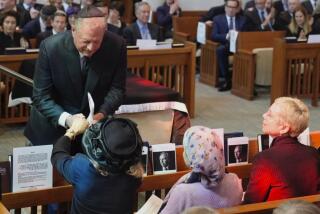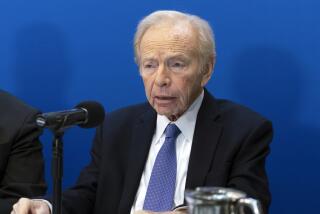Democratic Hopefuls Woo a Key Southerner
- Share via
COLUMBIA, S.C. — Why would one of Washington’s most prominent Democrats, Rep. Richard A. Gephardt of Missouri, make time to attend the dedication of a pedestrian bridge over a freeway in this sleepy Southern capital?
Who knew Sen. Joe Lieberman had such a keen interest in historically black colleges in the South, far from his native Connecticut?
And who can explain why another U.S. senator, John F. Kerry of Massachusetts, ventured to Columbia nearly two years ago, dancing into the night -- inside a municipal parking garage?
The answer to all of the above is the same: James E. Clyburn.
In this presidential nominating season, when scores of political bit players suddenly find themselves courted by the headliners, it’s arguable that no one has been as ardently pursued as the six-term Democratic congressman from South Carolina.
All nine contenders for the Democratic nomination have made a series of pilgrimages to Columbia, where most have devoted their sincerest attentions to all things Clyburn -- the pedestrian crossing, buildings at black colleges sorely in need of repair and even that parking garage, scene of the congressman’s annual fish fry.
He might be relatively unknown outside his home state, but Clyburn is the most respected black leader in South Carolina. When the onetime civil rights pioneer, teacher and state human rights commissioner announces his choice for president next week, the endorsement is expected to galvanize a network of Clyburn friends and associates, many of them leaders in their own right.
That prospect has proved alluring to the Democrats seeking the White House, who know that African Americans will cast about half the ballots in the state’s Feb. 3 primary. And the importance of the South Carolina vote looms large. While one of seven contests that day -- just a week after the first primary in New Hampshire -- it will be the first to seriously test the candidates’ popularity in the South and among blacks.
“Because of the way the media has set [expectations] up, none of the results on Feb. 3 will give the candidates more of a bump than South Carolina,” said Donald L. Fowler, former co-chairman of the Democratic National Committee and an advertising executive in Columbia. “It’s going to be very, very important.”
Polls have shown the candidates tightly bunched in the state, with up to two in every five Democrats still undecided. The race is seen as especially crucial for two sons of the South -- Sen. John Edwards of North Carolina and retired Gen. Wesley K. Clark of Arkansas. If they don’t win in the state, or come very close, their chances of earning the nomination would suffer a severe blow.
The primary also is important to the Rev. Al Sharpton, who wants to enhance his influence on the nomination and as a spokesman for African Americans nationally.
These candidates and the others have looked to Clyburn to give them a boost. But if he is enjoying all the attention, it’s hard to tell.
A no-nonsense man with gray hair, a thin mustache and a calming, gravelly voice, he has accepted his newfound status with the aplomb of someone who weathered much greater challenges -- the slurs and jail time that came while organizing sit-ins to desegregate one of the South’s most tradition-bound states.
“The top priority is finding somebody who can rev up the Democratic base -- someone who can bring emotionalism, excitement to the Democratic base.” Clyburn, 63, said. “That’s what’s important to me.”
For months, political experts have predicted Clyburn would endorse Gephardt, who helped the South Carolinian ascend a year ago to vice chairman of the House Democratic Caucus, fourth in rank among his party colleagues in the chamber.
On a tour of the state eight months ago, Clyburn said Gephardt made him what he is today. Other clues of the tight bond can’t be missed: Gephardt’s state campaign headquarters stands fewer than 100 yards down Columbia’s main drag, Gervais Street, from Clyburn’s district office. The man running the campaign office is Ike Williams, Clyburn’s longtime political lieutenant.
But Clyburn has studiously avoided tipping his hand.
Those who know him well say he has not prolonged the parade of candidates to Columbia for mere ego. Instead, he wanted to use the visits to build enthusiasm within a party that holds just two of 10 statewide offices.
Nor can the extra attention hurt in bringing assistance to the state and, particularly, Clyburn’s Columbia-based 6th District, where one in five residents lives in poverty.
Despite the expectation that he will endorse Gephardt, Clyburn remains in constant demand by the other candidates. They call for advice and introductions to South Carolina’s other movers -- a network that extends from his college fraternity brothers to fellow Masons and even beauticians -- “the ones who really know what people are thinking.”
During a recent interview in his office, his cellphone buzzed. “Hello, Congressman Clyburn,” came the voice on the other end. “This is Howard Dean. How are you?”
Clyburn put the phone down and chuckled softly. “He’s coming to town Sunday,” he said. “Wants to talk to me before he gets here.”
The congressman’s appeal may have been most evident at this year’s annual Clyburn fish fry. The night of free food and music inside a Gervais Street parking garage draws loyalists from around the state, especially those who can’t afford the $150-a-head tab at the Democratic Party’s Jefferson-Jackson Dinner earlier in the evening.
This May, seven of the presidential wannabes sampled deep-fried whiting with sides of white bread and hot sauce. Some danced as a deejay spun R&B; tunes. And Clyburn introduced the candidates to the crowd of about 1,500.
“They were falling all over themselves to be there,” said one attendee. Kerry and Edwards made the scene for the second year in a row.
They were not the only ones making early forays into South Carolina.
It was in April 2002 that Lieberman called Clyburn to say he wanted to come to the state to make a speech on higher education. Lieberman asked what the appropriate venue would be.
Before the senator knew it, Clyburn had not only recommended where to make the speech -- Allen University in Columbia -- but he was delivering a passionate appeal for Allen and other historically black colleges.
By the time Lieberman arrived in South Carolina a few weeks later, he told his audience he would push Clyburn legislation that would deliver federal money to restore dilapidated buildings at the schools.
True to his word, Lieberman helped get Congress to agree to spend $50 million over five years on the work. “We couldn’t have done it without him,” Clyburn says of Lieberman. “He was a real horse for us.”
Did his position of influence in South Carolina’s primary help bring Lieberman on board? “I’m sure it didn’t hurt,” Clyburn said.
Those wooing Clyburn know it will be hard to overcome his long-standing ties with Gephardt, the former leader of House Democrats. The two men became particularly close in 1999, when Clyburn voluntarily gave up his seat on the powerful Appropriations Committee to make room for a congressman who had switched from the Republican Party.
Colleagues told him he was crazy to give up such a “juice” assignment, but Clyburn eventually got his seat back, just as Gephardt had promised. And he had the Missourian’s blessing last year, when he was elevated to the party caucus hierarchy.
It was not such a surprise then, that Gephardt spoke at the dedication last spring of the James E. Clyburn Pedestrian Overpass across Interstate 270 in Columbia -- a project that linked a black neighborhood cut in two by the freeway.
Clyburn’s relationship with Dean appears more complicated.
He praised the candidate for his passion and strong policy positions. But Clyburn scolded Dean for his bid to appeal to Southern voters with Confederate flags on their pickup trucks.
“He told me it might have been an unfortunate metaphor or something like that,” Clyburn recalled. “And I said, ‘Yes, it was.’ ”
Dean has one potent weapon in his effort to coax Clyburn to his side: Ralph Dawson. The corporate litigator took high school government classes from Clyburn, then landed at Yale University a few years later with a freshman roommate named Howard Dean.
Today, Dawson seems to have his old teacher, Clyburn, on speed dial. “Good Lord,” the congressman says with a laugh, “he has bent my ear about Howard Dean.”
In a few more days, the buzzing of Clyburn’s cellphone should calm. Then he will be promised to just one candidate.
“I’ll just turn myself over to their state director,” he said, “and ask them what they need me to do.”
More to Read
Get the L.A. Times Politics newsletter
Deeply reported insights into legislation, politics and policy from Sacramento, Washington and beyond. In your inbox twice per week.
You may occasionally receive promotional content from the Los Angeles Times.










